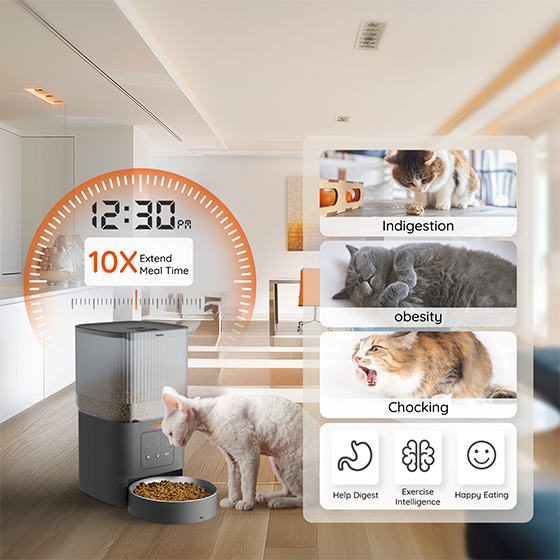jack452 jack452
ผู้เยี่ยมชม
dafino8925@sinagalore.com
Top 7 Common Health Issues in Pets and How to Prevent Them (24 อ่าน)
18 พ.ค. 2568 00:13
As pet owners, we cherish our furry companions and want them to live long, healthy lives. One of the best ways to ensure their well-being is through preventive care. By being aware of common health issues and taking proactive steps, we can help our pets avoid serious illnesses and enjoy a better quality of life.
Issue 1: Dental Health Issues
1.1 Common Dental Problems
Dental health is crucial for pets, yet it is often overlooked. Common dental problems in pets include periodontal disease, tooth decay, and gingivitis.
1.2 Signs and Symptoms of Dental Issues
Signs of dental problems can range from bad breath and drooling to difficulty eating and swollen gums. If left untreated, these issues can lead to pain, infection, and even organ damage.

1.3 Prevention Tips
Regular Brushing: Brush your pet's teeth regularly with pet-safe toothpaste to remove plaque and prevent tartar buildup.
Dental Chews and Toys: Offer dental chews and toys that clean teeth and massage gums.
Routine Vet Check-Ups: Schedule regular veterinary check-ups to monitor your pet’s dental health and address any issues early.
Issue 2: Obesity
2.1 Causes of Obesity in Pets
Obesity in pets is often caused by overfeeding, lack of exercise, and feeding them high-calorie or inappropriate foods.
2.2 Health Risks Associated with Obesity
Obesity can cause various health problems, such as diabetes, heart disease, and joint issues. It also reduces your pet's lifespan and overall quality of life.

2.3 Prevention Tips
Balanced Diet and Portion Control: Feed your pet a balanced diet appropriate for their age, breed, and activity level. Use portion control to avoid overfeeding.
Regular Exercise: Ensure your pet gets regular exercise through walks, playtime, and other physical activities.
Monitoring Weight and Body Condition: Regularly monitor your pet’s weight and body condition to detect early signs of obesity.

Recommendation
Consider using the WOpet WiFi automatic pet feeder. Its Slow Feeding Mode ensures your furry friend eats at a controlled pace, helping to prevent indigestion, choking, and obesity.

Issue 3: Parasites
3.1 Types of Common Parasites
Common parasites in pets include fleas, ticks, and worms (such as heartworms, roundworms, and tapeworms).
3.2 Symptoms of Parasitic Infections
Symptoms of parasitic infections can include itching, hair loss, diarrhea, vomiting, and visible worms in feces.
3.3 Prevention Tips
Regular Use of Preventive Medications: Use veterinarian-recommended preventive medications for fleas, ticks, and worms.
Keeping the Living Environment Clean: Maintain a clean living environment to reduce the risk of parasites.
Routine Vet Visits for Screenings: Regular veterinary visits for screenings and early detection of parasites.
Issue 4: Skin Allergies
4.1 Common Allergens and Their Sources
Pets can develop allergies to various substances, including pollen, dust mites, certain foods, and flea bites.
4.2 Symptoms of Skin Allergies
Symptoms of skin allergies include itching, redness, swelling, and frequent licking or scratching.

4.3 Prevention Tips
Identifying and Avoiding Allergens: Work with your vet to identify allergens and avoid them as much as possible.
Regular Grooming and Bathing: Regular grooming and bathing can help remove allergens from your pet’s coat.
Veterinary Guidance for Severe Cases: Seek veterinary guidance for severe or persistent cases of skin allergies.
Issue 5: Ear Infections
5.1 Causes of Ear Infections
Ear infections in pets can be caused by bacteria, yeast, allergies, and foreign bodies.
5.2 Signs and Symptoms to Look For
Signs of ear infections include head shaking, scratching at the ears, discharge, and a foul odor.
5.3 Prevention Tips
Regular Ear Cleaning: Clean your pet's ears regularly with vet-approved ear cleaning solutions.
Keeping Ears Dry: Keep your pet’s ears dry, especially after baths or swimming.
Routine Vet Examinations: Schedule routine vet examinations to check for early signs of ear infections.
Issue 6: Gastrointestinal Issues
6.1 Common Gastrointestinal Problems
Common gastrointestinal issues in pets include vomiting, diarrhea, and constipation.
6.2 Symptoms to Watch For
Symptoms to watch for include changes in appetite, lethargy, and changes in stool consistency or frequency.

6.3 Prevention Tips
Proper Diet and Nutrition: Feed your pet a balanced diet appropriate for their species and life stage.
Avoiding Toxic Foods and Substances: Keep toxic foods and substances out of reach and educate yourself on what is harmful to your pet.
Monitoring and Managing Stress Levels: Stress can affect your pet's digestive health, so maintain a stable and stress-free environment.
Issue 7: Joint and Mobility Issues
7.1 Common Joint Problems
Common joint problems in pets include arthritis, hip dysplasia, and ligament injuries.
7.2 Symptoms of Joint Issues
Symptoms include limping, stiffness, reluctance to move, and difficulty rising or lying down.
7.3 Prevention Tips
Maintaining a Healthy Weight: Keeping your pet at a healthy weight reduces stress on their joints.
Regular Exercise Tailored to the Pet's Needs: Provide regular exercise suited to your pet’s age and physical condition.
Supplements and Medications as Advised by a Vet: Use supplements and medications as recommended by your vet to support joint health.
Conclusion
Preventive care is key to maintaining your pet’s health and well-being. By addressing common health issues proactively, you can help your furry friend lead a longer, happier life. Always consult with your vet for personalized advice and regular check-ups.
We encourage you to share your experiences and tips on pet health in the comments below. Don’t forget to subscribe to our blog for more pet health tips and updates.
source : Top 7 Common Health Issues in Pets and How to Prevent Them
jack452 jack452
ผู้เยี่ยมชม
dafino8925@sinagalore.com